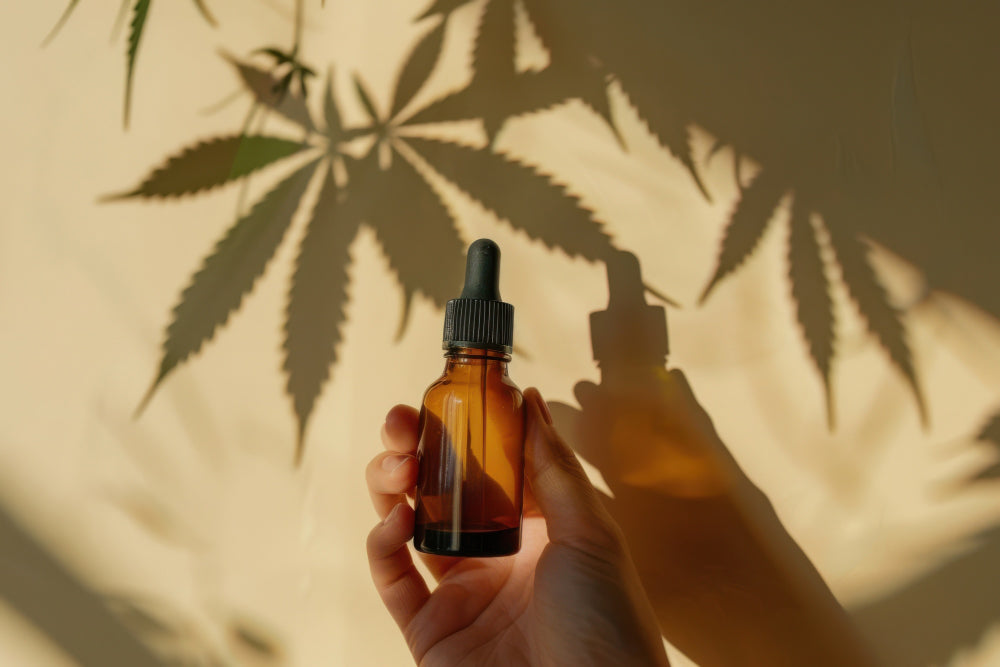In recent years, CBD has become one of the most sought-after natural remedies, especially in the cannabis community. The growing demand for this non-psychoactive cannabinoid is due to its diverse health benefits, which are appealing to an increasing number of people looking for natural alternatives to conventional medications. In this blog post, we will take an in-depth look at the basics of CBD , its effects on the human body, its applications, and the legal framework. Our goal is to give you a comprehensive overview of this fascinating cannabinoid and show you why CBD represents a promising therapeutic agent.
What is CBD?
CBD, short for cannabidiol, is one of over 100 cannabinoids found in the cannabis plant. Unlike THC, which is responsible for the psychoactive effects of cannabis, CBD is non-intoxicating and therefore does not have any mind-altering effects. This property makes CBD particularly interesting for medicinal applications, as it has numerous positive effects on the body without making the user "high." CBD interacts with the body's endocannabinoid system (ECS), a network of receptors involved in the regulation of many vital functions, including sleep, appetite, pain perception, and immune responses. This interaction can lead to a harmonization of internal balance, which explains why CBD can be helpful for so many different ailments.
The effect of CBD
CBD has garnered considerable interest in the medical community due to its diverse effects on the human body. It interacts with the endocannabinoid system (ECS), which plays a central role in regulating numerous physiological processes, including pain perception, mood, sleep, and immune responses. This interaction allows CBD to positively impact the body in a variety of ways, making it a promising agent for treating a range of health issues.
How CBD works in the body
CBD works primarily by modulating CB1 and CB2 receptors in the endocannabinoid system. These receptors are distributed throughout the body and play a key role in maintaining the balance of various biological functions. CB1 receptors are primarily found in the brain and central nervous system and influence processes such as pain perception, appetite, and mood. CB2 receptors, on the other hand, are predominantly located in the immune system and peripheral tissues and are responsible for regulating inflammatory processes. By interacting with these receptors, CBD can, for example, reduce inflammation, relieve pain, and stabilize mood. Furthermore, CBD influences serotonin receptors in the brain, which may explain why it can also be helpful for anxiety disorders and depression.
Scientific studies on CBD
Scientific research on CBD has increased significantly in recent years. Numerous studies have investigated its diverse therapeutic potential and demonstrated its potential for effectiveness in a range of health problems. The use of CBD in epilepsy has been particularly well-researched, where it has proven highly effective in reducing seizures, particularly in rare and severe forms of the disease. Studies have also shown positive results in other areas, such as pain management, the treatment of anxiety and sleep disorders, and the reduction of inflammation. Although research is still in its infancy, the findings so far are promising and indicate that CBD could play an even greater role in medicine in the future.
Areas of application of CBD
CBD is an extremely versatile natural product that can be used to treat a wide range of health problems. Its applications are diverse, and as scientific research in this field continues to advance, new potential uses are constantly being discovered. From pain relief to the treatment of serious neurological disorders, CBD has the potential to play an important role in many areas of medicine.
Which illnesses does CBD help with?
CBD has proven useful in the treatment of a variety of conditions. It shows particular promise in chronic pain by inhibiting inflammation and reducing the sensation of pain. People with arthritis, fibromyalgia, or back pain often report a significant improvement in their symptoms by taking CBD. There is also evidence that CBD can also be helpful for anxiety disorders and depression, as it promotes the release of serotonin in the brain and thus has a mood-enhancing effect. CBD also shows positive effects in neurological disorders such as epilepsy or multiple sclerosis, reducing the frequency and severity of seizures and relieving muscle spasticity. There are also studies that indicate a possible antipsychotic effect of CBD, making it a potential treatment option for schizophrenia and other mental disorders.
Differences in application
The way CBD is applied can vary depending on the medical condition and individual needs. The most commonly used form is CBD oil, which is taken sublingually and has a rapid onset of action. For people who prefer a continuous release of the active ingredient, CBD capsules or tablets may be a better choice. This form is particularly suitable for daily use in chronic conditions. For skin problems or inflammation just beneath the skin, such as arthritis, topical application in the form of CBD creams or balms may be more effective. Dosage also plays an important role: While low-dose products may be sufficient for minor complaints, higher doses are often required for more serious conditions. It is therefore important to adapt the application to the individual and, if necessary, discuss it with a doctor to achieve the best results.
Safety and side effects of CBD
Although CBD is generally considered safe and well-tolerated by many people, it's important to be aware of potential side effects and interactions with other medications. Especially with higher doses or prolonged use, side effects can occur that should be considered. Furthermore, there are certain medications with which CBD can interact, leading to unwanted effects.
Known side effects
Most people tolerate CBD well, but there are some side effects that can occur when taking it. The most common include fatigue, diarrhea, and changes in appetite or weight. These side effects are usually mild and temporary, but can be more severe, especially with high doses. In rare cases, dizziness or dry mouth may also occur. However, these side effects usually only occur with higher doses and are generally not cause for concern. Nevertheless, it is advisable to start taking CBD slowly and gradually increase the dose to allow the body to acclimate to the active ingredient and minimize potential side effects.
Drug interactions
CBD can interact with various medications, particularly those metabolized by the cytochrome P450 enzyme system in the liver. This enzyme system is responsible for the breakdown of many medications, and CBD can inhibit or enhance its activity, which can alter the concentration of the medication in the blood. This can lead to undesirable effects, such as an increase in the effect and associated side effects, or a decrease in the effect, which could impair the effectiveness of the medication. Caution is particularly advised with blood thinners, antidepressants, and antiepileptic drugs. Therefore, it is important to consult a doctor before taking CBD, especially in higher doses, to discuss potential risks and interactions and to adjust your intake accordingly.
Legal status of CBD
The legal status of CBD varies worldwide and can vary considerably by country. In Germany and many other European Union countries, CBD is legal under certain conditions, but this is not the case everywhere. Therefore, it is important to understand the legal regulations before purchasing or using CBD products.
Legal regulations in Germany
In Germany, the sale of CBD products is legal as long as the THC content is below 0.2%. This regulation ensures that CBD products do not produce psychoactive effects and are therefore exempt from the restrictive regulations of the Narcotics Act (BtMG). CBD oils, capsules, and other products that comply with this limit can therefore be legally purchased in pharmacies, drugstores, and online shops. Importantly, however, these products may not be advertised as medicinal products unless they are licensed accordingly. This means that manufacturers and sellers are not permitted to make health claims suggesting a therapeutic effect unless the product is an officially licensed medication. This can be confusing for consumers, as many products are sold as dietary supplements that may offer therapeutic benefits but cannot be advertised as such.
Differences to other countries
While Germany has clear and strict regulations regarding the sale and use of CBD products, the legal situation varies considerably in other countries. In the United States, for example, CBD has been legal at the federal level since the passage of the 2018 Farm Bill, provided it is derived from hemp and has a THC content below 0.3%. However, regulations regarding the sale and use of CBD products vary from state to state. In some states, the sale of CBD products is completely legal, in others there are restrictions, and in a few states, CBD is still illegal. In countries like Japan, CBD is legal as long as it does not contain THC, while in others, like Singapore and the United Arab Emirates, it is strictly prohibited. These differences make it especially important for travelers and expats to inform themselves about local laws before carrying or purchasing CBD products.
Conclusion
CBD is a promising natural product with numerous possible applications. Its popularity is constantly growing, and the regulatory framework is evolving. Research to date suggests that CBD could be a valuable addition in many areas of medicine, but further studies are needed to fully understand its full potential and long-term effects.
Summary of the main points
CBD offers a wide range of potential health benefits, ranging from pain relief and the treatment of anxiety disorders to support for neurological disorders. Despite its diverse positive effects, it's important to educate yourself about its proper use and possible side effects. Especially for people who are already taking other medications, it's advisable to discuss CBD use with a doctor to avoid potential interactions. The legal situation in Germany is clearly regulated, but anyone traveling or living abroad should familiarize themselves with the respective regulations to avoid legal issues.
Outlook and future developments
Research on CBD is still in its early stages, but the results so far are promising. Future studies could reveal further possible uses and contribute to a better understanding of its effects. The legal situation is also likely to evolve, which could facilitate access to high-quality CBD products . At the same time, the increasing acceptance of CBD as a therapeutic agent could mean that more people can benefit from the health advantages of this cannabinoid. Furthermore, further research into cannabinoids could lead to new, even more effective products tailored to specific health problems.







1 comment
nvsuvsagpy
Muchas gracias. ?Como puedo iniciar sesion?
Leave a comment
This site is protected by hCaptcha and the hCaptcha Privacy Policy and Terms of Service apply.